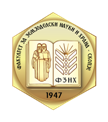INSTITUTIONS AND INSTITUTIONAL CHANGE: WHAT IMPEDES FARMERS’ COOPERATION IN NORTH MACEDONIA?
Keywords:
cooperatives, human behavior, institutions, rural development.Abstract
Small farmers struggle to accomplish their best interests in environments and value chains with large and organized buyers. Farmers in general should be able to recognize their interest in joining some form of cooperative organization such as an association, an agricultural cooperative or a producer organization. However, despite the large number of agricultural operators in North Macedonia, the number and functionality of agricultural cooperatives are still very low. The historical, cultural and socio-economic features largely influenced the way associations, cooperatives and organizations of agricultural producers in the country are formed. These features may also provide answers on the crucial conditions for these association to function. The norms of human behavior in the agricultural sector in North Macedonia are difficult to alter. The multiple changes in the social order and the negative experiences in the association of the rural population in the past have great impact on the cooperative models to this day. In this context, the paper focuses on the historical and current perspectives impeding the formation and functioning of agricultural cooperatives in the Macedonian agriculture.



